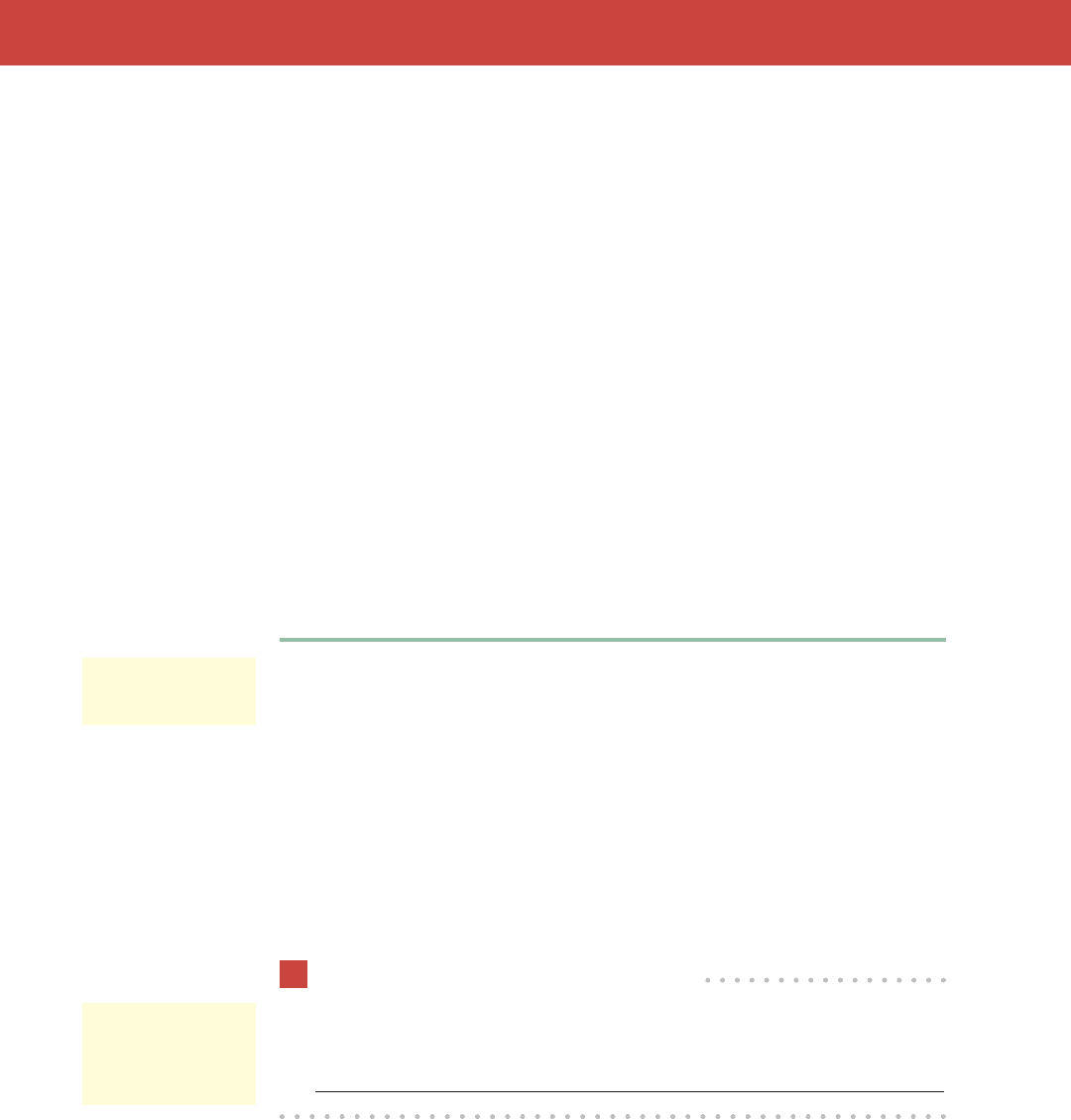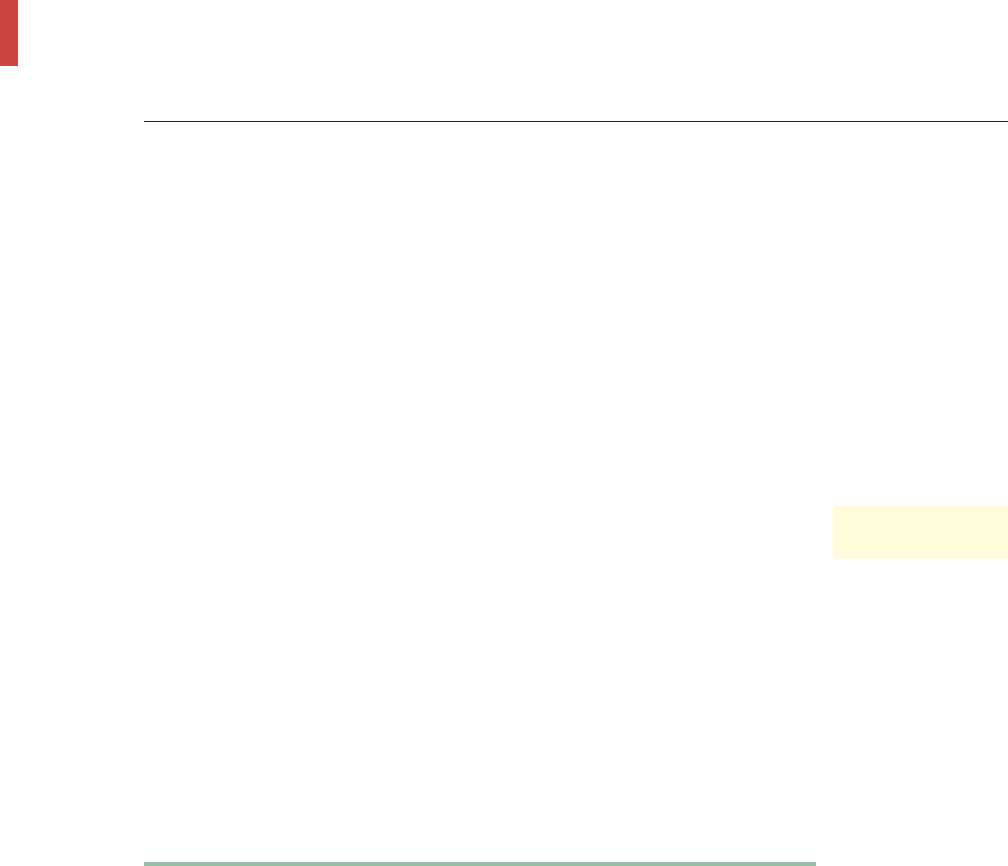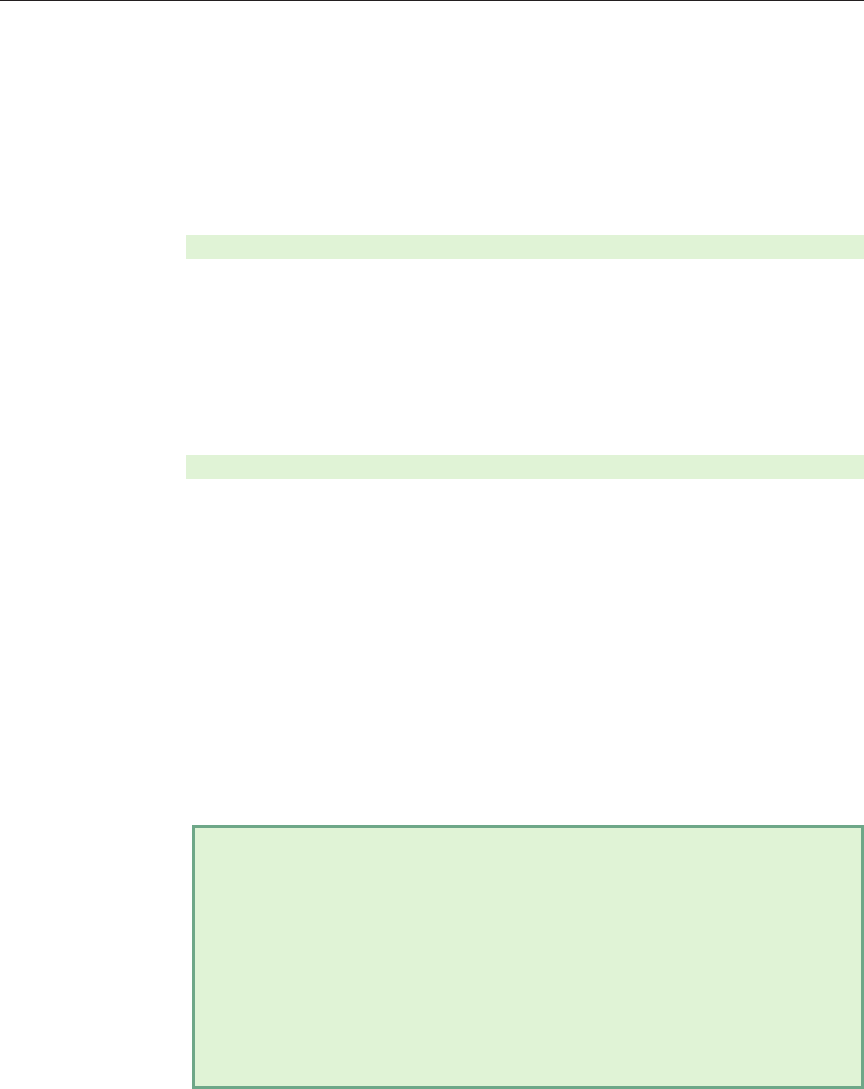Anker Susan. Real Essays with Readings with 2009 MLA Update
Подождите немного. Документ загружается.


EDITING ESSAYS
Chapter 35 • Commonly Confused Words 657
4. I should ( have / of ) made a hard copy and a backup on a disk, but I
didn’t.
5. Today I have ( a / an / and ) interview for a job I really want, and I can’t
locate any résumés ( accept / except ) one from 2003.
6. ( Loosing / Losing ) a résumé is not the end of the world, but it will be
( quiet / quite ) a job reconstructing it.
7. It took me hours to ( right / write ) and proofread my most recent
résumé.
8. This morning, I quickly ( set / sit ) down some information to give to
the interviewer, but this version is sloppier ( than / then ) the résumé I
( use / used ) to have.
9. ( Though / Through ) I believe that I am well qualifi ed for this job, I’m
afraid that this résumé may have a bad ( affect / effect ) on my chances of
being hired.
10. An interviewer ( who’s / whose ) task is to hire the best person must pay
attention ( to / too / two ) small details.
Edit Paragraphs and Your Own Writing
Edit the following paragraphs for commonly confused words.
EDITING REVIEW 1 (18 errors)
(1) Most people no that Americans love to drive there cars. (2) How-
ever, many people may not be conscience of how much the government
does to support our car culture. (3) For instance, the United States would
never of had so many good highways without federal and state assistance
for road construction and maintenance. (4) New highways are usually
■ For more practice
with commonly
confused words, visit
Exercise Central at
bedfordstmartins
.com/realessays.
ANK_47574_35_ch35_pp647-659 r4 ko.indd 657ANK_47574_35_ch35_pp647-659 r4 ko.indd 657 10/29/08 10:23:13 AM10/29/08 10:23:13 AM

EDITING ESSAYS
658 Part Six • Word Use
paid for mainly buy tax money. (5) It is rare for a new road too be paid
for with tolls, which would come exclusively from the people driving on it.
(6) Americans also expect they’re roads to be well maintained, and they
may right to their representatives to complain about potholes and aging
road surfaces. (7) The government is even responsible for keeping gas
prices lower here then in most other industrialized nations.
(8) Few people mine that the government assists drivers in these
ways. (9) Some would argue that its a government’s job to help pay for
transportation. (10) However, other forms of transportation in this coun-
try are often past over when Congress hands out funds. (11) Amtrak, the
U.S. railroad, may soon loose virtually all government funds, even though
many government offi cials are skeptical of it’s ability to keep operating
without government assistance. (12) Accept for a few places like New
York and San Francisco, most U.S. cities do not have good mass transit
systems. (13) Americans who’s travels have taken them to certain parts of
the world praise the national train systems and city transit systems they
fi nd there. (14) As traffi c gets worse in our nation’s urban and suburban
areas, some people fi ne it odd that the United States does not invest more
in transportation that would allow people to leave there cars at home.
EDITING REVIEW 2 (14 errors)
(1) Hoping to keep are nation’s blood supply safe, the U.S. govern-
ment has placed restrictions on donating blood. (2) Anyone whose spent
more than fi ve years in Europe or more than three months in England
since 1980 is not allowed to give blood. (3) Offi cials hope that asking
about time in Europe will help them fi ne people who might of been
ANK_47574_35_ch35_pp647-659 r4 ko.indd 658ANK_47574_35_ch35_pp647-659 r4 ko.indd 658 10/29/08 10:23:13 AM10/29/08 10:23:13 AM

EDITING ESSAYS
Chapter 35 • Commonly Confused Words 659
exposed to mad cow disease. (4) Men are also asked whether they have
had sexual relations with other men in the passed ten years. (5) If they
have, their asked not to give blood. (6) This is suppose to protect the
blood supply from the AIDS virus. (7) Of course, they’re are some prob-
lems with these restrictions. (8) First, know one knows how much ex-
posure to infected meat can give a person mad cow disease, and know
one is sure how long the disease can hide in a human body. (9) Second,
many gay men our not infected with HIV, and many women, who are not
asked about sexual activity, are infected. (10) Restricting certain groups
of people from giving blood may not do anything to protect the blood
supply, but it will certainly effect the amount of blood available. (11) Is it
better to allow the blood supply to become dangerously low then to allow
people who’s blood might carry a disease to donate blood?
PRACTICE 2 EDITING YOUR OWN WRITING
FOR COMMONLY CONFUSED WORDS
As a fi nal practice, edit a piece of your own writing for commonly confused
words. It can be a paper you are working on for this course, a paper you’ve
already fi nished, a paper for another course, a recent piece of writing from
your work or everyday life, or your idea journal entry. Add any misused words
you fi nd to your personal list of confusing words.
ANK_47574_35_ch35_pp647-659 r4 ko.indd 659ANK_47574_35_ch35_pp647-659 r4 ko.indd 659 10/29/08 10:23:13 AM10/29/08 10:23:13 AM

660
36
Spelling
Using the Right Letters
Understand the Importance
of Spelling Correctly
Unfortunately, spelling errors are easy for readers to spot, and they make
a bad impression. Fortunately, practice greatly improves spelling.
Read the following paragraph, the body of a follow-up letter one stu-
dent wrote to a prospective employer after an interview:
Thank you for the oportunity to meet about the summer internship at
Margate Associates. I hope you will fi nd that my coursework in graphic
design and my excellant communication skills make me a promiseing
candidate for the position. I look forward to hearing from you soon. I am
happy to provide you with referances if you need them.
PRACTICE 1 FINDING SPELLING ERRORS
Underline the four spelling errors in the preceding paragraph. In the space
provided, write the correct spelling of each word.
If you are serious about improving your spelling, you need to have a
dictionary and a spelling list (a list of words you often misspell) — and you
need to use them.
■ IDEA JOURNAL
Describe a place in
your town or city.
■ For more spelling
practice, visit
Exercise Central at
bedfordstmartins
.com/realessays.
ANK_47574_36_ch36_pp660-670 r5 ko.indd 660ANK_47574_36_ch36_pp660-670 r5 ko.indd 660 10/29/08 10:23:39 AM10/29/08 10:23:39 AM

EDITING ESSAYS
Chapter 36 • Spelling 661
A dictionary contains the correct spellings of words, along with in-
formation on how they are pronounced, what they mean, and where they
came from. When proofreading your papers, use a current dictionary either
in print or online. The following are two popular online dictionaries:
• Merriam-Webster Online at www.m-w.com. This dictionary has a
wildcard search feature. If you are fairly sure how the beginning of a
word is spelled, you can enter those letters and then an asterisk (*) and
get a list of the words that begin with the letters. From the list, you can
choose the word you want.
• Your Dictionary at www.yourdictionary.com. This site features
specialty dictionaries for business, computers, law, medicine, and other
fi elds.
If you have trouble fi nding words in a regular dictionary, get a spelling
dictionary, which is designed to help you fi nd a word even if you have no
idea how to spell it. Checking a dictionary is the single most important
thing you can do to improve your spelling.
Keeping a spelling list will help you edit your papers and learn how
to write the words correctly. From this list of words you often misspell,
identify your personal spelling “demons” — the fi ve to ten words that you
misspell most frequently. Write these words, spelled correctly, on an index
card, and keep the card somewhere handy so that you can consult it when-
ever you write.
Practice Spelling Correctly
Don’t try to correct your grammar, improve your message, and check
your spelling at the same time. Instead, do separate proofreading passes
for each editing task.
Most word-processing programs have a spell checker that fi nds and
highlights a word that may be misspelled and suggests other spellings.
However, no spell checker can catch every mistake. A spell checker ignores
anything it recognizes as a word, so it will not help you fi nd words that are
misused or misspellings that are also words. For example, a spell checker
would not highlight any of the problems in the following phrases:
Just to it. (Correct: Just do it.)
The strap is lose. (Correct: The strap is loose.)
my writing coarse (Correct: my writing course)
■ For a sample diction-
ary entry, see page 634.
ANK_47574_36_ch36_pp660-670 r5 ko.indd 661ANK_47574_36_ch36_pp660-670 r5 ko.indd 661 10/29/08 10:23:40 AM10/29/08 10:23:40 AM

EDITING ESSAYS
662 Part Six • Word Use
Use the following proofreading techniques to focus on the spelling
of one word at a time. Different techniques work for different people, so
try them all and then decide which ones work for you.
PROOFREADING TECHNIQUES
•
Put a piece of paper or a ruler under the line you are reading.
• Cut a “window” in an index card that is about the size of a
long word (such as misunderstanding), and place it over your
writing to focus on one word or phrase at a time.
• Proofread your paper backward, one word at a time.
• If you are using a computer, print out a version of your paper
that looks noticeably different: Make the words larger, make
the margins larger, triple-space the lines, or do all of these.
Read this version carefully.
• Read your paper aloud. This strategy will help you if you tend
to leave words out.
• Exchange papers with a partner. Your only task as you proof-
read your partner’s paper should be to identify possible
misspellings.
After you proofread each word in your paper, look at your personal
spelling list and your list of demon words one more time. If you used
any of these words in your paper, go back and check their spelling again.
(Most word-processing programs allow you to search for specifi c words
using Find or Search commands from the Edit menu.) You may be sur-
prised to fi nd that you missed seeing the same old spelling mistakes.
PRACTICE 2 FINDING AND CORRECTING SPELLING MISTAKES
Take a paper you are working on, and fi nd and correct any spelling errors
using the tools discussed previously — a dictionary, your personal spelling list,
proofreading techniques, and a spell checker. How many spelling mistakes did
you fi nd? Were you surprised? How was the experience different from what
you normally do to edit for spelling?
Five Steps to Better Spelling
Learning to fi nd and correct spelling mistakes that you have already made is
only half the battle. You also need to become a better speller so that you do
not make so many mistakes in the fi rst place. Here are fi ve ways to do so.
ANK_47574_36_ch36_pp660-670 r5 ko.indd 662ANK_47574_36_ch36_pp660-670 r5 ko.indd 662 10/29/08 10:23:40 AM10/29/08 10:23:40 AM

EDITING ESSAYS
Chapter 36 • Spelling 663
Step 1. Master Ten Troublemakers
The ten words on the following list were identifi ed by writing teachers as
the words most commonly misspelled. Because there are only ten, you
should be able to memorize them.
INCORRECT CORRECT
alot a lot
arguement argument
defi nate, defenite defi nite
develope develop
lite light
necesary, nesesary necessary
recieve receive
seperate separate
surprize, suprise surprise
untill until
Step 2. Master Your Personal Spelling Demons
Once you know what your personal spelling demons are, you can master
them. Try some of the following techniques.
• Create a memory aid — an explanation or saying that will remind you of
the correct spelling. For example, “surprise is no prize” may remind you
to spell surprise with an s, not a z.
• Break the word into parts, and try to master each part. You can break
it into syllables (Feb ru ar y) or separate the prefi xes and endings (dis
appoint ment).
• Write the word correctly ten times.
• Write a paragraph in which you use the word at least three times.
• Say the letters of the word out loud. See if there’s a rhythm or a rhyme
you can memorize.
• Say the whole word out loud, emphasizing each letter and syllable even
if that’s not the way you normally say it. For example, say prob a bly in-
stead of prob ly. Try to pronounce the word this way in your head each
time you spell it.
• Ask a partner to give you a spelling test.
ANK_47574_36_ch36_pp660-670 r5 ko.indd 663ANK_47574_36_ch36_pp660-670 r5 ko.indd 663 10/29/08 10:23:40 AM10/29/08 10:23:40 AM

EDITING ESSAYS
664 Part Six • Word Use
Step 3. Master Commonly Confused Words
Refer back to Chapter 35, which covers twenty-seven sets of words that
are commonly confused because they sound alike, such as write/right and
its/it’s. If you can master these commonly confused words, you will avoid
many spelling mistakes.
Step 4. Learn Six Spelling Rules
If you can remember the following six rules, you can avoid or correct
many of the spelling errors in your writing.
Before the six rules, here is a quick review of vowels and consonants.
Vowels: a e i o u and sometimes y
Consonants: all the letters that are not vowels
The letter y can be either a vowel or a consonant. It is a vowel when it
sounds like the y in fl y or hungry. It is a consonant when it sounds like the
y in yellow.
Rule 1. I before e / Except after c / Or when sounded like a / As in
neighbor or weigh.
Many people repeat this rhyme to themselves as they decide whether a
word is spelled with an ie or an ei.
piece (i before e) receive (except after c) eight (sounds like a)
EXCEPTIONS: either, neither, foreign, height, seize, society, their,
weird
Rule 2. Drop the fi nal e when adding an ending that begins with a
vowel.
hope + ing = hoping imagine + ation = imagination
Keep the fi nal e when adding an ending that begins with a consonant.
achieve + ment = achievement defi nite + ly = defi nitely
EXCEPTIONS: argument, awful, simply, truly (and others)
ANK_47574_36_ch36_pp660-670 r5 ko.indd 664ANK_47574_36_ch36_pp660-670 r5 ko.indd 664 10/29/08 10:23:40 AM10/29/08 10:23:40 AM

EDITING ESSAYS
Chapter 36 • Spelling 665
Rule 3. When adding an ending to a word that ends in y, change
the y to i when a consonant comes before the y.
lonely + est = loneliest apology + ize = apologize
happy + er = happier likely + hood = likelihood
Do not change the y when a vowel comes before the y.
boy + ish = boyish survey + or = surveyor
pay + ment = payment buy + er = buyer
EXCEPTIONS 1. When adding -ing to a word ending in y, always
keep the y, even if a consonant comes before it:
study + ing = studying.
2. Other exceptions include daily, dryer, said, and paid.
Rule 4. When adding an ending that starts with a vowel to a one-
syllable word, double the fi nal consonant only if the word ends with
a consonant-vowel-consonant.
chop + ed = chopped shop + ing = shopping
hot + er = hotter strap + ed = strapped
Do not double the fi nal consonant if the word ends with some other
combination.
VOWEL-VOWEL-CONSONANT VOWEL-CONSONANT-CONSONANT
clean + est = cleanest slick + er = slicker
poor + er = poorer teach + er = teacher
clear + ed = cleared last + ed = lasted
Rule 5. When adding an ending that starts with a vowel to a word
of two or more syllables, double the fi nal consonant only if the
word ends with a consonant-vowel-consonant and the stress is on
the last syllable.
admit + ing = admitting control + er = controller
admit + ed = admitted
ANK_47574_36_ch36_pp660-670 r5 ko.indd 665ANK_47574_36_ch36_pp660-670 r5 ko.indd 665 10/29/08 10:23:40 AM10/29/08 10:23:40 AM

EDITING ESSAYS
666 Part Six • Word Use
Do not double the fi nal consonant in other cases.
problem + atic = problematic offer + ed = offered
understand + ing = understanding
Rule 6. Add s to most words, including words that end in o pre-
ceded by a vowel.
MOST WORDS WORDS THAT END IN VOWEL PLUS O
book + s = books video + s = videos
college + s = colleges stereo + s = stereos
jump + s = jumps radio + s = radios
Add -es to words that end in s, -sh, -ch, or x and o preceded by a
consonant.
WORDS THAT END IN S, -SH, -CH, OR X WORDS THAT END IN CONSONANT PLUS O
class + es = classes potato + es = potatoes
push + es = pushes hero + es = heroes
bench + es = benches go + es = goes
fax + es = faxes
EXCEPTIONS: pianos, solos (and others)
Step 5: Consult a Spelling List
The following is a list of the one hundred most commonly misspelled
words. Consult this as you proofread your writing.
One Hundred Commonly Misspelled Words
absence
achieve
across
aisle
a lot
already
analyze
answer
appetite
argument
athlete
awful
basically
beautiful
beginning
believe
business
calendar
career
category
chief
column
coming
commitment
ANK_47574_36_ch36_pp660-670 r5 ko.indd 666ANK_47574_36_ch36_pp660-670 r5 ko.indd 666 10/29/08 10:23:41 AM10/29/08 10:23:41 AM
